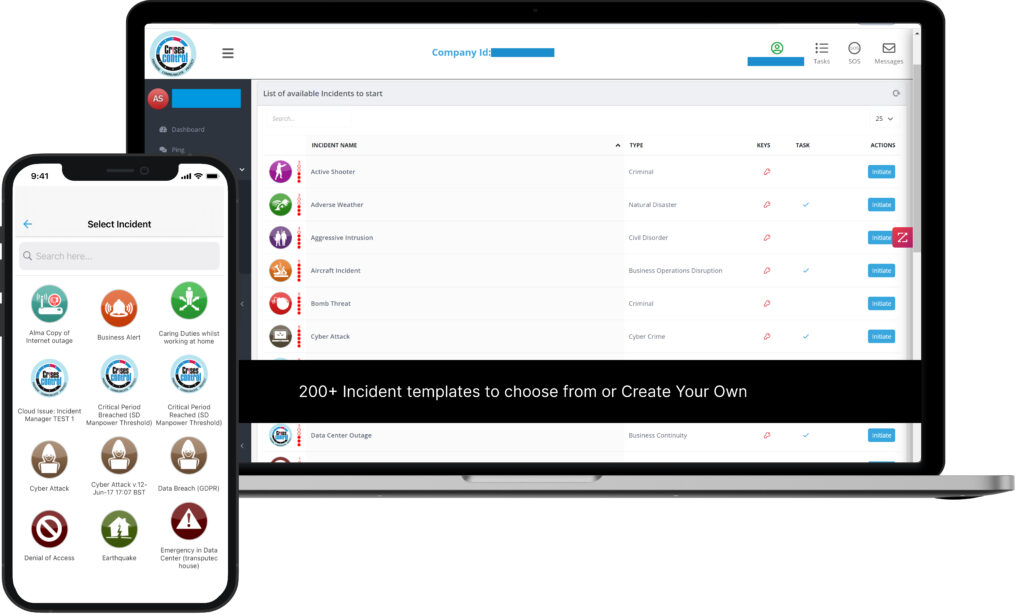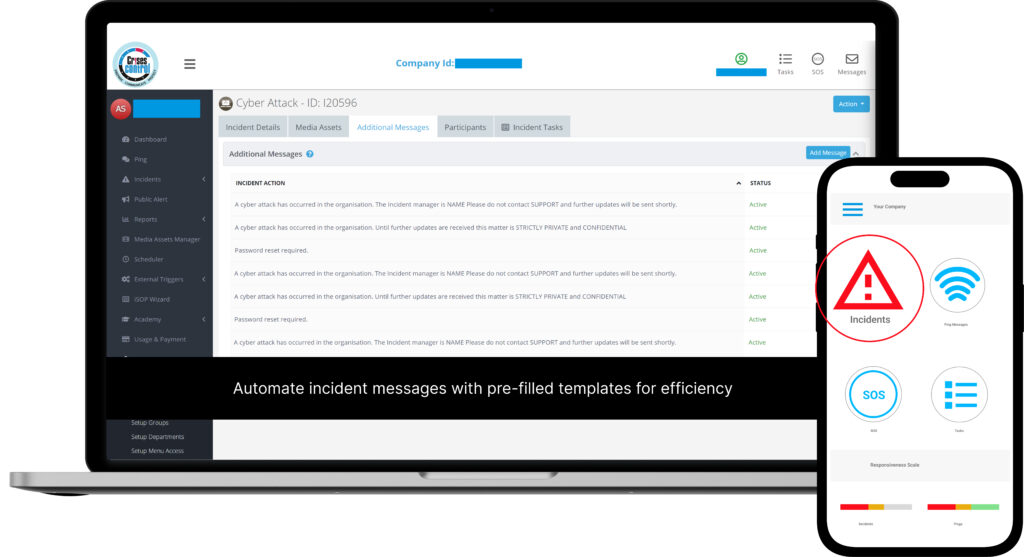Written by Anneri Fourie | Marketing Executive
In today’s fast-paced and interconnected world, organisations are more susceptible to disruptions than ever before. These disruptions can take many forms, from natural disasters and cyberattacks to IT outages and public relations crises. When a crisis hits, it’s critical to be able to respond quickly and effectively to minimise damage and ensure business continuity.
This is where incident management software comes in. Incident management software is a powerful tool that can help organisations of all sizes prepare for, respond to, and recover from incidents.
This blog explores why Incident Management Software is vital for organisations and how Crises Control can provide the solutions needed to navigate these challenges effectively.
The Importance of Incident Management Software
Enhancing Response Time and Efficiency
When an incident occurs, time is of the essence. The faster an organisation can respond, the better its chances of mitigating damage and resuming normal operations. Incident Management Software (IMS) plays a critical role in enhancing response times and efficiency. By automating alert notifications and providing real-time updates, IMS ensures that the right people are informed immediately and that response teams can coordinate their actions seamlessly.
With Crises Control, organisations benefit from a system designed to optimise response protocols. The platform’s automated workflows and intelligent notification system ensure that every second counts, significantly reducing the time it takes to mobilise a response.
Centralising Incident Data
One of the biggest challenges during a crisis is the fragmentation of information. Data silos can lead to miscommunication, delays, and ineffective decision-making. Incident Management Software centralises all incident-related data, providing a single source of truth that can be accessed by all relevant stakeholders.
Crises Control excels in data centralisation, offering a comprehensive dashboard that aggregates information from various sources. This central hub allows for better tracking, analysis, and reporting of incidents, ensuring that decision-makers have all the information they need at their fingertips.
Ensuring Compliance and Accountability
Regulatory compliance is a significant concern for many organisations. Incident Management Software helps ensure that all actions taken during an incident are documented and that compliance with relevant regulations is maintained. This is particularly important for industries with strict regulatory requirements, such as finance, healthcare, and energy.
Crises Control provides robust reporting and auditing features that help organisations demonstrate compliance. Every action taken during an incident is logged, providing a clear audit trail that can be reviewed by regulators and stakeholders alike.
Facilitating Communication and Collaboration
Effective communication is the cornerstone of successful incident management. Incident Management Software provides tools that facilitate communication and collaboration among team members, regardless of their location. This is crucial for coordinating a response across different departments and geographical locations.
Crises Control’s communication tools are designed with this need in mind. The platform includes secure messaging, conference calling, and task management features that keep everyone on the same page. This ensures that all team members can collaborate effectively, even under the most challenging circumstances.
How Crises Control Supports Incident Management

Comprehensive Incident Management Capabilities
Crises Control offers a suite of features specifically designed to support every stage of incident management. From initial alerting and response coordination to post-incident analysis, Crises Control provides a comprehensive solution that covers all aspects of incident management.
Real-Time Incident Tracking
One of the standout features of Crises Control is its real-time incident tracking capability. This feature allows organisations to monitor the progress of an incident response in real time, providing invaluable insights into how the situation is evolving. This real-time visibility ensures that response strategies can be adjusted on the fly, enhancing the overall effectiveness of the response.
Automated Workflows and Notifications
Automation is a key component of effective incident management. Crises Control’s automated workflows and notifications ensure that predefined protocols are followed and that the right people are alerted immediately. This reduces the potential for human error and ensures a swift, coordinated response.
Customisable Dashboards and Reports
Every organisation has unique needs when it comes to incident management. Crises Control offers customisable dashboards and reporting tools that allow organisations to tailor the platform to their specific requirements. Whether it’s tracking key performance indicators or generating detailed incident reports, Crises Control provides the flexibility needed to meet diverse organisational needs.
Integration with Existing Systems
Organisations often rely on a variety of systems and tools to manage their operations. Crises Control is designed to integrate seamlessly with existing systems, ensuring that organisations can leverage their current investments while enhancing their incident management capabilities. This interoperability makes Crises Control a versatile and cost-effective solution for organisations of all sizes.
The Benefits of Using Crises Control

Improved Resilience and Business Continuity
At its core, effective incident management is about resilience. By ensuring that organisations can respond quickly and effectively to incidents, Crises Control helps maintain business continuity. This minimises downtime and ensures that critical operations can continue, even in the face of significant disruptions.
Enhanced Decision-Making
With centralised data and real-time tracking, Crises Control empowers decision-makers with the information they need to make informed decisions. This leads to more effective incident response and better overall outcomes.
Increased Stakeholder Confidence
Stakeholders, including customers, employees, and investors, need to know that an organisation is prepared for crises. Using a robust Incident Management Software like Crises Control demonstrates a commitment to preparedness and can significantly enhance stakeholder confidence.
Cost Savings
While the initial investment in Incident Management Software may seem significant, the cost savings over time can be substantial. By reducing the impact of incidents and minimising downtime, Crises Control helps organisations save money and protect their bottom line.
Trigger Alerts 96% Faster
Emergency software integration with Crises Control aids monitoring systems such as fire alarms or IT ticketing systems to improve alert to response times by 96% against a call tree. This significant reduction in response times ensures that critical incidents are addressed swiftly, minimising potential damage and disruption.
96% Reduction in Time to Engage Stakeholders
Crises Control excels in stakeholder engagement, reducing the time to engage stakeholders by 96%. In scenarios where every second counts, this capability ensures that all necessary parties are informed and can take immediate action.
20% Improvement in Incident Resolution Times
With Crises Control, organisations can achieve a 20% improvement in incident resolution times. This efficiency not only helps in quickly restoring normal operations, but also in reducing the overall impact of incidents.
99.5% High Availability
Crises Control guarantees 99.5% high availability, ensuring that the platform is operational 24/7, 365 days a year. This reliability is crucial for organisations that need to be prepared for incidents at any time.
Conclusion: Why Choose Crises Control for Incident Management Software?
In an unpredictable world, having a reliable Incident Management Software is critical for organisational resilience and operational continuity. Crises Control provides a comprehensive, user-friendly platform that enhances response times, centralises incident data, ensures compliance, and facilitates effective communication and collaboration.
Ready to transform your incident management strategy? Contact us today for a free personalised demo and discover how Crises Control can help your organisation stay prepared and resilient in the face of any crisis.
By choosing Crises Control, you’re not just investing in software—you’re investing in the future security and resilience of your organisation. Don’t wait until the next crisis hits; prepare now and ensure your organisation is ready to respond effectively to any incident.
Request a FREE Demo

FAQs
1. What are the biggest challenges organisations face during an incident?
Critical data can be scattered across different departments and systems, hindering communication and making it difficult to get a holistic view of the situation. Manual notification systems and unclear workflows can lead to delays in response, potentially causing more damage. Without a central information hub, decision-makers might lack crucial details to make informed choices, hindering overall recovery efforts.
Incident management software bridges these gaps by centralising data, automating workflows, and facilitating communication, empowering organisations to overcome these challenges.
2. How can Crises Control improve my organisation’s response times?
Crises Control automates workflows, ensuring predefined actions are taken automatically, eliminating the need for manual intervention and saving valuable time during a crisis. With real-time incident tracking, your team can monitor the situation as it unfolds and adjust response strategies on the fly. This proactive approach minimises wasted time and ensures a more effective response.
By combining these features, Crises Control can significantly reduce response times, allowing your organisation to address incidents swiftly and minimise damage.
3. What are the benefits of using Crises Control beyond incident response?
– Improved preparedness
– Enhanced business continuity
– Data-driven insights
The platform helps develop comprehensive incident response plans, ensuring everyone knows their roles and responsibilities during a crisis. By minimising downtime and facilitating a swift recovery, Crises Control safeguards business continuity and keeps your operations running smoothly.







